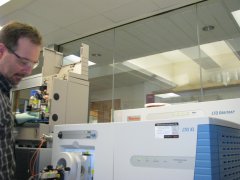Thermo Fisher Scientific Inc., the world leader in serving science, today announced that a team of researchers at Children's Hospital Boston identified a promising biomarker, known as LRG, that they believe will help physicians diagnose acute pediatric appendicitis more accurately and efficiently. The team conducted its research on a Thermo Scientific LTQ Orbitrap mass spectrometer and discovered several potential biomarkers, including leucine-rich alpha-2-glycoprotein (LRG).

Biomarkers are biological indicators, commonly detected in blood, urine or tissue samples, which can reveal key risk indicators for a disease, the presence of a disease or shed light on how a disease may develop in an individual. In addition to their use in pre-clinical research and clinical diagnosis, biomarkers play a significant role in the early treatment of certain diseases.
The research was inspired by the reality that appendicitis diagnosis often requires long hours in an emergency room and expensive diagnostic imaging procedures. Even worse, incorrect diagnosis leads to unnecessary surgeries - in one out of every ten to twenty appendectomies a healthy appendix is removed. The Children's Hospital team, led by Hanno Steen, PhD, director of the Proteomics Center at Children's Hospital Boston, with Alex Kentsis, MD, PhD and Richard Bachur, MD of the Division of Emergency Medicine, used an LTQ Orbitrap mass spectrometer to study over an 18-month period protein and peptides in urine samples from 67 children. Dr. Steen's findings show that the LRG biomarker is a consistent and accurate indicator of appendicitis and that LRG levels directly correlate with the severity of infection.
"Given the time spent diagnosing appendicitis, the radiation exposure due to computed tomography, and the number of unnecessary surgeries, we're naturally very excited about the implications of identifying these biomarkers," said Dr. Hanno Steen, "The next step for us is to look for biomarkers for adult appendicitis and fulfill our vision of developing a rapid urine test, using a simple dipstick, to accelerate testing and improve accuracy and reliability."
"The Children's Hospital Boston team is demonstrating the promise of mass spectrometry for breakthrough medical research by using it to discover biomarkers that will ultimately impact patient care," said Robert Kane, sales representative at Thermo Fisher Scientific. "In the past few years, this technology has advanced - with greater speed and precision - to a point where scientists are discovering biomarkers more rapidly."